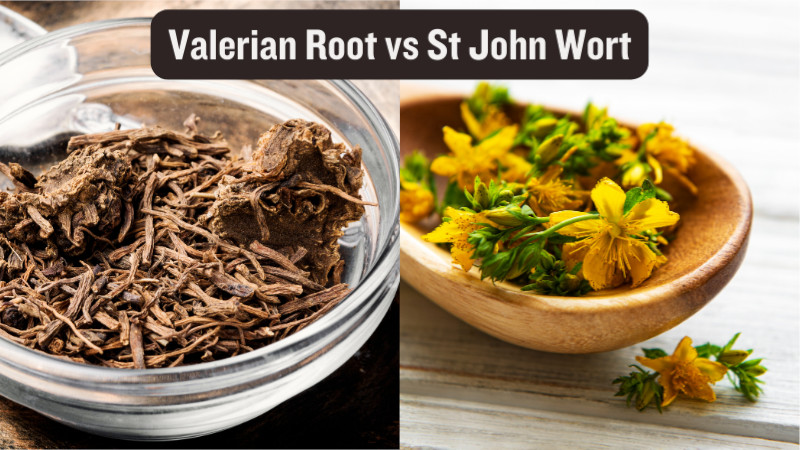In the bustling aisles of health food shops, amidst the natural remedies and age-old secrets, two names often stand out. And so it begins, the Valerian Root vs St Johns Wort showdown. These aren’t just fancy names from a medieval potion recipe; they’re two of nature’s most intriguing gifts to our well-being.
But what happens when these two powerful opponents face off? Which one takes the crown, and more importantly, which one is right for you?
Dive in with us as we uncover the mysteries of these herbal wonders, St Johns Wort and Valerian Root, breaking down their benefits in a way everyone can grasp. Whether you’re a curious newbie or a seasoned herbal enthusiast, this journey promises to be enlightening!
Table of Contents
St Johns Wort: A Comprehensive Overview
Hypericum perforatum, also known as St. John Wort, is a natural herb that has been the subject of intrigue and reverence for centuries. These plants are indigenous to both temperate and tropical regions. 1
Did you know that it encompasses nearly 500 species of herbs or low shrubs that belong to the Hypericaceae family?
Its name is derived from its blooming season, which coincides with the summer solstice, around St. John’s Day (St. John the Baptist) on June 24th.
Historically, this herb was not just a medicinal remedy but also held a significant place in cultural and spiritual practices. As early as the 1st century AD, the Roman military doctor Proscurides administered it as a remedy. 2
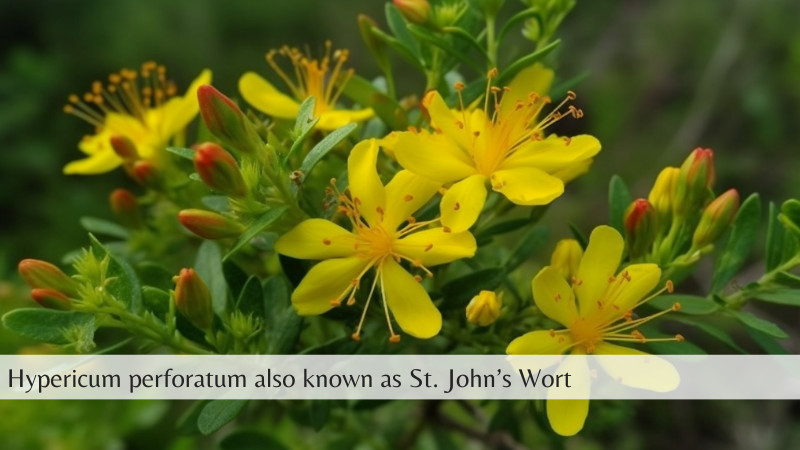
However, its prominence surged during the Middle Ages, when it was often used in what were considered to be magic potions. Beyond its medicinal applications, it was believed to protect humans and animals from witches, demons, and evil diseases. 3
The father of chemistry, Paracelsus, showed an interest in St. John’s Wort, emphasising its deep-rooted significance in both medicine and folklore. 4
Available Common Forms of St. John’s Wort
Understanding the different ways it can be taken, the most effective ways to do so, and the prescribed amounts is very important. For a better understanding, let’s go into these details.
Different forms, whether it be capsules, pills, teas, oils or powders, can affect the body in unique ways. Knowing the right method of consumption and the correct dosage is crucial for achieving the desired effects safely. It’s also important to consider any potential interactions with other substances or medications.
Common Forms
- Capsules and Tablets
- These are the most common forms and are available in different varieties.
- Teas
- The dried herb is placed in boiling water.
- Tinctures and Oils
- These have been used to treat a variety of skin conditions, including minor wounds, burns, sunburn
s, abrasions, bruises, contusions, ulcers, myalgia, and more. 5
- These have been used to treat a variety of skin conditions, including minor wounds, burns, sunburn
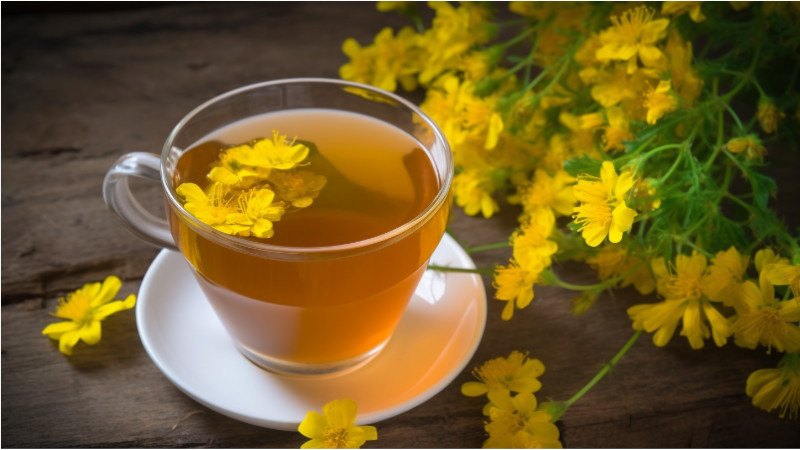
Whether you’re sipping it as a soothing HerbiTea Sleepy Tea blend or applying it as a balm, St. John’s Wort offers multiple consumption methods:
- Orally – Capsules, tablets, and teas are typically taken orally. 6
- Topical Application – Oils or balms can be applied directly to the skin for certain conditions.
The potency and effects of St. John’s Wort can vary based on how it’s consumed. Here are some general recommended dosages:
| Adults | For adults using it as a nutritional supplement, most practitioners tend to recommend one capsule containing 300 mg with a hypericin concentration of 0.3%, three times daily. 7 |
| Person with depression | Doses between 500 to 1,800 mg/day are typically recommended, which are usually split into 2-3 separate intakes daily. 8 |
St John’s Wort 5 Amazing Medicinal Benefits
St. John’s Wort has been a beacon of hope for many seeking natural treatments. Let’s explore some of its notable medicinal benefits.
- Antidepressant Properties
- St. John’s Wort is primarily recognised for its potential as an over-the-counter anti-depressive or anxiolytic. It has been shown to treat major depression more effectively than a placebo antidepressant. However, it’s essential to note that while some studies have confirmed its benefits, others have not found it more beneficial than a placebo. 9
- Treatment of Emotional and Behavioral Complications in Children
- Children and young adults facing prolonged emotional or attention problems, anxiety, physical issues, sleep disturbances, and other emotional and behavioural complications might benefit from St. John’s Wort. In one study, children with these challenges received St. John’s Wort in combination with valerian root and passionflower, which improved their emotional and behavioural complications without the need for other medications. 10
- Potential Treatment for Obsessive-Compulsive Disorder (OCD)
- Relief from Premenstrual Syndrome (PMS)
- PMS encompasses a range of symptoms experienced by some women before menstruation, including bloating, acne, breast tenderness, irritability, and depression. In a systematic review, St. John’s Wort has been explored as an alternative treatment that might alleviate PMS symptoms, although more research is needed to confirm its efficacy. 13 14
- Treatment for Psoriasis
- St. John’s Wort has demonstrated potential in treating mild to moderate psoriatic lesions. In a double-blind study, topical Hypericum perforatum was used to treat plaque-type psoriasis. The study found that the ointment’s anti-inflammatory properties reduced cytokine content in psoriatic lesions, leading to reduced erythema, thickness, and scaling compared to a placebo. 15
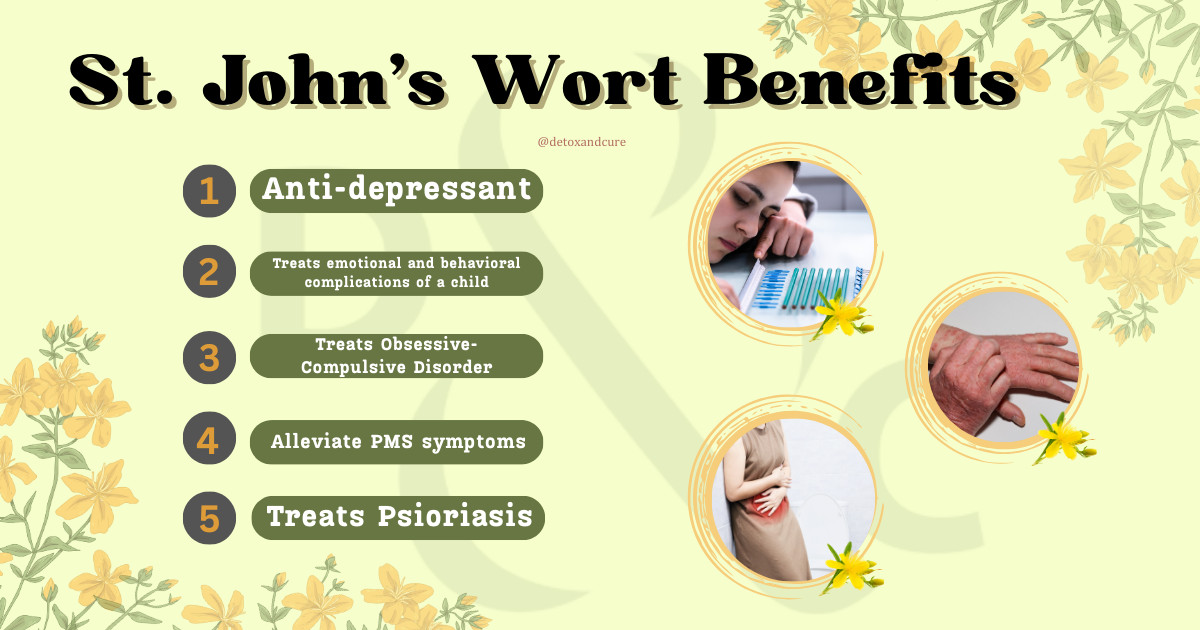
Now, a gentle reminder to please note that while St. John’s Wort has shown potential in various medicinal applications, it’s crucial to consult with a healthcare provider before using it, especially given potential interactions with other medications and conditions.
St. John Wort Precautions
It is never a good idea to just rush into making something new a part of your day without considering it based on your needs. So, let’s delve into the precautions associated with St. John’s wort:
- Interactions with Medications
- St. John Wort can interact with several medications, potentially reducing their effectiveness or causing harmful effects. Drugs used to treat migraines, specifically those in the triptan category (like sumatriptan, commonly known as Imitrex), along with the pain-relief medication tramadol, can elevate serotonin levels. These drugs may have potential interactions with St. John’s wort similarly. 16
- Photosensitivity
- Some individuals taking St. John’s wort might experience increased sensitivity to sunlight, leading to sunburns even with minimal sun exposure. 17
- Surgical Considerations
- If you’re scheduled for surgery, it’s essential to inform your surgeon about your St. John’s wort intake, as it can affect serotonin levels and interfere with anesthesia and other medications used during surgery. 18
- Pregnancy and Breastfeeding
- Pregnant or breastfeeding women should exercise caution and consult with a healthcare provider before using St. John’s wort, as its safety during these periods is not well-established. 19
- Allergic Reactions
- Though rare, some people might experience allergic reactions to St. John’s wort. It’s essential to discontinue use and seek medical attention if you notice symptoms like rash, itching, or swelling. 20
Valerian Root: A Brief Insight
Valerian root, scientifically known as Valeriana officinalis, is native to Europe and parts of Asia. This plant can grow to just over 6 feet tall and is recognisable by its strong odour.
Historically, Valerian root has been revered for its sedative properties and has been utilised in traditional medicine since ancient Greek and Roman times.
While it has been commonly used for sleep disorders, especially insomnia, its significance extends beyond just being a sleep aid. The root’s historical prominence is a testament to its enduring value in herbal remedies throughout the ages.
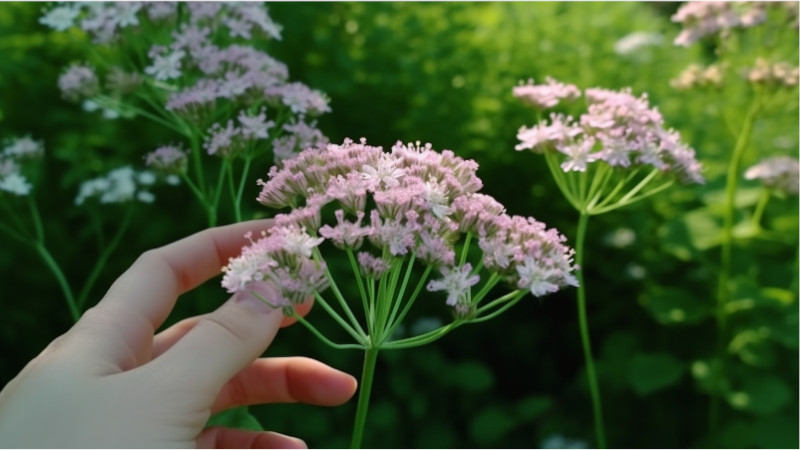
To delve deeper into the myriad benefits and uses of this ancient herb, we have crafted a comprehensive article on ‘What’s valerian root good for?‘ that provides you with a comprehensive insight into its multifaceted applications in modern wellness.
Valerian Root vs St Johns Wort Side Effects
St. John’s wort is generally considered safe, however, its potential side effects may include:
- Agitation and anxiety
- Dizziness
- Diarrhea, constipation, and stomach discomfort
- Dry mouth
- Fatigue and insomnia
- Headache
- Increased sensitivity to sunlight (photosensitivity)
Particular consideration needs to be given to other medications you may already be using as this could conflict with them. 21
Valerian root has been a go-to herbal remedy for many seeking natural relief from ailments like insomnia. However, like all supplements, being informed about potential side effects is crucial.
While many people find valerian root beneficial, some might experience adverse reactions. Some side effects associated with valerian root may include:
- Headaches
- Upset stomach
- Dry mouth
- Daytime drowsiness

- Vivid dreams
- Dizziness
- Heart palpitations
- Thinking problems
- Dry eyes
It’s essential to approach Valerian root with an informed perspective and consult with a healthcare professional before incorporating it into your routine.
Precautions When Taking Valerian Root
Valerian root is a popular herbal supplement used for centuries to address various health concerns. Some precautions to consider when taking valerian root may include:
- Drowsiness and Sedation
- Serotonin receptors, which are connected to mood and sleep, are influenced by Valerian root as well. It has also been discovered that the Valerian root lowers activity in the motor cortex of the brain. 22
- Withdrawal Symptoms
- Long-term use of valerian root might lead to dependence. Suppose you decide to stop taking valerian after using it for an extended period. In that case, it’s advisable to reduce the dose gradually over a week or two to avoid potential withdrawal symptoms. 23
- Liver Function
- Some medications are metabolised by the liver, and valerian root might influence how quickly the liver processes these drugs. This could alter the effects and potential side effects of these medications. 24
- Interactions with Alcohol and Medications
- Valerian root may intensify the sedative effects of medications and alcohol, and it should be used cautiously with drugs like anticonvulsants, barbiturates, benzodiazepines, insomnia treatments, and tricyclic antidepressants. 25
- Surgery Concerns
- Due to its sedative effects, it’s recommended to discontinue valerian root at least two weeks before undergoing surgery. Valerian might interfere with anesthesia and other medications used during surgical procedures. 26
- Pregnancy and Breastfeeding
- The safety and effects of valerian root when pregnant and breastfeeding are very crucial and need professional advice when considering taking it.
Always consult a healthcare provider before starting or stopping any supplements, including valerian root. They can provide guidance tailored to your specific situation and ensure that valerian is safe and appropriate for you.
FAQs
Is there anything better than St John’s Wort?
For its possible ability to elevate mood, St. John’s wort has long been working. However, each person reacts differently to it.
While some find it beneficial, others might seek alternatives. The efficacy of any herbal remedy or medication often depends on the individual’s specific needs, body chemistry, and the nature of their condition.
Does Valerian Root Increase Serotonin?
Valerian root is primarily known for its sedative properties, which can help promote relaxation and sleep. While it’s not conclusively proven that valerian root directly increases serotonin levels, some studies suggest it might influence the GABA (gamma-aminobutyric acid) system in the brain, which can indirectly affect serotonin pathways.
However, more research is needed to understand the relationship between valerian root and serotonin fully.
What are the disadvantages of Valerian Root?
Valerian root, like any supplement, can come with potential side effects. Some individuals might experience drowsiness, dizziness, stomach upset, or dry mouth.
It’s also essential to be cautious when combining valerian root with other sedative medications or alcohol, as it can enhance their effects. Long-term use might lead to dependence, and discontinuing suddenly can result in withdrawal symptoms.
Is GABA or Valerian Root better for anxiety?
Both GABA and valerian root are used as natural remedies to address anxiety. GABA is a neurotransmitter that plays a crucial role in reducing neuronal excitability, and supplements can help increase its levels in the brain.
Valerian root, on the other hand, is believed to influence the GABA system, promoting relaxation. The choice between GABA and valerian root largely depends on individual preferences, the nature of the anxiety, and how one’s body reacts to each supplement.
Conclusion
In the realm of natural remedies, both valerian root and St. John’s Wort have carved out a significant place for themselves. Each boasts its own set of benefits, historical significance, and precautions. While valerian root has been celebrated for its calming effects, St. John’s Wort is often regarded for its potential mood-enhancing properties.
However, as with all herbs used as supplements, it’s essential to approach them with an informed perspective, understanding their potential interactions and side effects. We hope this article has shed light on these two fascinating offerings from Nature and their respective roles in holistic health.
But the conversation doesn’t end here! We invite you to share your thoughts, insights and experiences on the valerian root vs St John’s wort discussion on Instagram and Pinterest.
References
- “Saint-John’s-wort” – The Editors of Encyclopedia Britannica, 4 May 1999 [Britannica] [Archive] ↩︎
- “St John’s Wort and Related Drug Interactions” – S. Sarker, R. Paul, H. Pal, S. Shwe, Last checked 26 October 2023 [International Journal of Integrative Medical Sciences] [Archive] ↩︎
- “Medical Attributes of St. John’s Wort (Hypericum perforatum)” – K. Klemow, A. Bartlow, J. Crawford, N. Kocher, J. Shah, M. Ritsick, Last checked 26 October 2023 [National Library of Medicine] [Archive] ↩︎
- “Paracelsus – St. John’s Wort” – S. Anliker, Last checked 26 October 2023 [Paracelsus Health and Healing] [Archive] ↩︎
- “Topical Application of St. Johnʼs Wort (Hypericum perforatum)” – U. Wolfe, G. Seelinger, C. Schempp, 8 November 2013 [Planta Med] [Archive] ↩︎
- “St. John’S Wort – Uses, Side Effects, and More” – WebMD Staff, Last checked 27 October 2023 [WebMD] [Archive] ↩︎
- “St John’s Wort” – B. Peterson, H. Nguyen, 16 May 2023 [National Library of Medicine] [Archive] ↩︎
- “St. John’s Wort for Depression” – S. Kramer, 16 July 2023 [DynaMed] [Archive] ↩︎
- “St John’s wort for major depression” – K. Linde, M. Berner, L. Kriston, 8 October 2008 [PubMed] [Archive] ↩︎
- “Herbal triplet in treatment of nervous agitation in children” – I. Trompetter, B. Krick, G. Weiss, 22 November 2012 [PubMed] [Archive] ↩︎
- “St. John’s Wort For OCD: Does It Work?” – R. Langham, 24 March 2023 [Impulse Therapy] [Archive] ↩︎
- “Herbal medicines and phytochemicals for obsessive-compulsive disorder” – Z. Ayati, J. Sarris, D. Chang, S. Emami, R. Rahimi, 2 March 2020 [PubMed] [Archive] ↩︎
- “Effects and treatment methods of acupuncture and herbal medicine for premenstrual syndrome/premenstrual dysphoric disorder: systematic review” – S. Jang, D. Kim, M. Choi, 10 January 2014 [PubMed] [Archive] ↩︎
- “The Efficacy of Hypericum perforatum (St John’s Wort) for the Treatment of Premenstrual Syndrome” – Author, Date [Springer Nature] [Archive] ↩︎
- “The impact of topical Saint John’s Wort (Hypericum perforatum) treatment on tissue tumor necrosis factor-alpha levels in plaque-type psoriasis: A pilot study” – P. Mansouri, S. Mirafzal, P. Najafizadeh, Z. Naraghi, M. Surmaghi, F. Hasemian, Last checked 27 October 2023 [PubMed] [Archive] ↩︎
- “St. John’s Wort” – NYU Langone Health Staff, Last checked 27 October 2023 [NYU Langone Health] [Archive] ↩︎
- “Phototoxicity in human lens epithelial cells promoted by St. John’s Wort” – Y. He, C. Chignell, D. Miller, U. Andley, J. Roberts, Last checked 27 October 2023 [PubMed] [Archive] ↩︎
- “St. John’s wort” – Mount Sinai Staff, Last checked 27 October 2023 [Mount Sinai] [Archive] ↩︎
- “Safety and efficacy of St. John’s wort (hypericum) during pregnancy and lactation” – J. Dugoua, E. Mills, D. Perri, G. Koren, 3 November 2006 [PubMed] [Archive] ↩︎
- “Adverse effects profile of the herbal antidepressant St. John’s wort (Hypericum perforatum L.)” – E. Ernst, J. Rand, J. Barnes, C. Stevinson, Last checked 27 October 2023 [National Library of Medicine] [Archive] ↩︎
- “St John’s Wort: information sheet for health care professionals” – TGA Staff, 13 March 2000 [Therapeutic Goods Administration] [Archive] ↩︎
- “Valerian Root for Sleep” – J. Summer, Last checked 15 November 2023 [Sleep Foundation] [Archive] ↩︎
- “Valerian” – MHA Staff, Last checked 27 October 2023 [Mental Health America] [Archive] ↩︎
- “Valerian” – NIH Staff, 5 April 2020 [National Library of Medicine] [Archive] ↩︎
- “Possible Interactions with: Valerian” – St. Luke’s Hospital Staff, Last checked 27 October 2023 [St. Luke’s Hospital] [Archive] ↩︎
- “Valerian” – Mount Sinai Staff, 27 October 2023 [Mount Sinai] [Archive] ↩︎
Last Updated on 5 months by D&C Editorial Team
